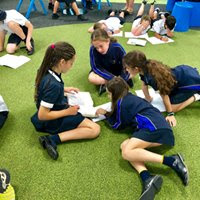Talk And The Developing Writer
Talk And The
Developing Writer.
Talk is an integral part of learning, and no less so within
the writing workshop. The legendary writing researcher, writer and educator,
Donald Graves, regularly encouraged young writers to think aloud and articulate
their writing intentions. He wanted young writers to give voice to the intended
direction of their, soon to emerge, writing.
It is said, the more we articulate our intentions, the more
likely we are to actually pursue them. So, providing opportunities for inexperienced
writers to engage in this kind of targeted talk needs to be embraced within the
working structures of the writing workshop.
Graves further prompted young writers to explain their
individual writing processes - the journey and its associated actions that
brought about the writing piece.
Increasingly, the importance of sharing process is being
recognized as a critical component within the writing workshop. Young writers
need mindful mini lessons that teach into:
- · Writing craft
- · Writing style
- · Writing structure –grammar, punctuation, spelling
- · Writing processes-routines, rituals, considered actions
In every instance, talk is an essential consideration.
Teachers assist the development of writing among their students when they share and discuss their own writing. This action becomes much more impactful when teacher-writers not only share the writing pieces produced, but also the process they followed in creating that very same piece of writing. When this occurs, the value of such sharing rises appreciably.
With time and practice, young writers become increasingly more
skilled and confident at performing these critical writing actions. Regular opportunities
to talk and reflect aspects of their writing lives is the determining factor.
Donald Graves understood this. He witnessed this. He heard it shining through
in the words young writers began to articulate.
We, as teachers, learn through listening to the young writers
in our care. They become our informants. We, as the most experienced writers in
the classroom, must strive to mindfully set up workshop opportunities for
meaningful talk to have the desired impact.
With encouragement and practice, young writers begin to share
the stories that underpin their individual writing ideas. They reveal the extent
of their problem-solving capabilities, and let’s be clear - writing is
essentially a problem-solving exercise. They begin to reveal what they think
they need in order to succeed as writers; as learners.
As we listen, we begin to understand the inner mechanisms of
each learner. These revelations inform the demonstrations we must share. We owe
all this to the presence of quality classroom conversations and active
listening. Graves knew the genuine power of directed talk. His discoveries
continue to inform best practice in writing.








Comments
Post a Comment